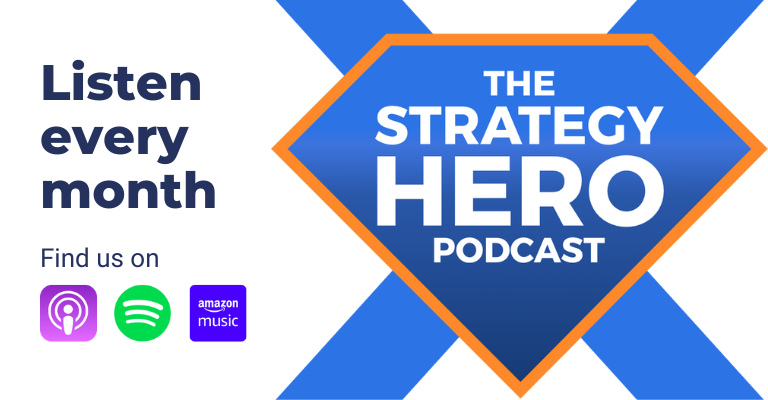While our first season of "Strategy Hero" was predominantly packed with guests from the Lean and Hoshin world, episode 5 sought to look at Gemba in practice in a policing environment, showing why the principles are not confined to factories.
While the first episodes of "Strategy Hero" were about tackling subjects that we all know and love, featuring guests that we're equally fond of, the fifth episode needed to be something different.
The season was all about the human side of what we do, day-in, day-out. Festus Akinbusoye, Police and Crime Commissioner in the UK's Bedfordshire, was totally different. He opened my eyes to see that you can apply practices like Gemba in almost any setting.
Here's what I took away from my time with Festus and our fifth episode, "leading strategy and change."
It’s important to note that my opinions do not reflect those of i-nexus or Festus Akinbusoye.
Enjoy!
Why Festus?
When building a guest list for something like a podcast, you decide on a theme and then find people who fit into that theme. You naturally start with familiar people - Pascal, Rachel, Fredrik, and James were all in that ballpark. But it always helps to get someone outside of the familiar.
As our producer, Sam, explained his relationship with Festus and the work he's been doing for over 20 years, it seemed something here could be built upon.
As we began prep for the episode, we ran through our usual format of getting to know Festus. Within minutes, our ears pricked up as Festus started talking about his challenges in his current role.
From there, we knew we had our theme - Gemba outside the confines of a factory. OK, not quite, but we did see Festus talking about leading strategy and change, but in an entirely different setting.
“It's very difficult to focus on two big things at the same time and give them the same weight.”
Finding your direction
In the episode's opening moments, Festus immediately opened up with his life story. What struck me as he went through the process of explaining his career path was that it was his time as a mentor to prisoners where his aspirations for Parliament took a left turn.
I feel we can all relate to having a personal or professional plan that can turn on a dime because of circumstances and the universe putting challenges and opportunities in our way.
It was the ability to have an impact that spoke to Festus.
But Festus' story also speaks to the ability of mentors to shape us.
"There is nothing that I will ask them to do that I'm not willing to do myself twice over, but of course I can't do everything, so I trust them."
Festus' father had a profound impact on him. That is where he found inspiration to continuously work hard, learn, and never give up. It's that mentality that Festus, and we all should, brings to his leadership.
"Guess what, I've got this idea." How often have we heard this from leaders? It's this mentality that's the spirit of the Hoshin Kanri toolkit.
"Sometimes leaders focus so much on the KPIs and on the outcomes... but we forget, at heart, leading an organization is ultimately about people, not about processes."
The human side of leadership
But leadership with a human nature doesn't mean being a pushover.
It does mean inspiring and empowering your team. Right from the moment you recruit, if you hire right, you'll have the right mentality.
But that doesn't always mean we hire our team; we'll often inherit a project or team with its issues.
Unfortunately, no two scenarios are the same; even if the facts look the same, the people involved are where you can affect change positively. You need to build a toolkit and use consistent principles that allow you to learn and refine how you lead.
That is the balancing act of change management.
"Anyone in a leadership position has got to be willing to allow their team members to fail on occasions, and allow themselves to fail - and not fear failure."
Gemba on the frontlines
As we moved into the heart of the topic, Festus shared stories of his time volunteering as a Special Constable. These are effectively police officers without being paid. It was that time that gave him a level of appreciation that he held onto when he became a leader.
He had a great point. If your strategy is completely disconnected from people on the front line:
- You lose credibility as a leader, as it's clear you don't know what you're talking about
- You'll fail without actually learning, as you don't understand how things unfold
- Your progress is going to stall
If you have experience, you can become more valuable to your leadership team and connect better with the frontline.
That was evident by Festus' story about how challenges can be filtered to leadership. That can happen because of the distance between the leaders and the people doing the work.
As I agreed, when you have done the work, you can easily relate once you keep moving up the ladder. If you have never spent a day in the life of those teams you're directing, you're going to struggle.
That's why Festus talks proudly about his Gembas. Those walks are an opportunity to hear firsthand how messages and work are being translated into the people delivering the strategy.
"The easiest thing for anyone to say in a leadership role is "I'm very busy.""
We need to be able to create space to be able to walk, talk, and observe the doing being done. As Festus said, those moments can be planned for, but you need to be willing. It's the only way to know how effective your strategy and processes are truly.
My takeaway
Change is about what not to do, not what you should do. Build strong networks. Be willing to learn.
We need to be willing to get onto the ground floor and work. It's only there that we can truly appreciate the effort and challenges that your teams experience.
Gemba doesn't even need a label. It's the spirit of getting out of offices and into the workplace. That needs to be part of your strategy.
Change your leadership, and your culture will follow.
That was a key message I took away from the episode.
Listen back to the episode
Festus' episode was the fifth of six in our opening season of Strategy Hero.
You can listen to Festus' episode here or search "Strategy Hero podcast" wherever you find your favorite podcasts.
About Strategy Hero
Published on the last Thursday of every month, the Strategy Hero podcast delves into the world of business strategy and transformation.
Each cast shines a spotlight on a Strategy Hero – inspirers, boundary pushers, and leaders of change from all walks of life – armed with practical advice on achieving your goals.
Episodes explore topics around operational excellence, Lean management, process improvement, change management, and much, much more. Available where all great podcasts live, listen on-demand today, and discover the Strategy Hero inside you.
About the host
James Milsom is Head of Marketing at i-nexus, but James is a storyteller. He’s the UK’s biggest Georgia Bulldogs fan (Go Dawgs!) and lives and breathes marketing.
The Strategy Hero podcast is his opportunity to bring some of his conversations with mentors, inspirers, and people anew to you every month.
He’s behind the content read and watched by people like you and lives to educate and help others.
If you’d like to learn more about him, connect with him on LinkedIn and subscribe to the Strategy Hero podcast today!



.jpg?width=352&name=KPIs%20(3).jpg)